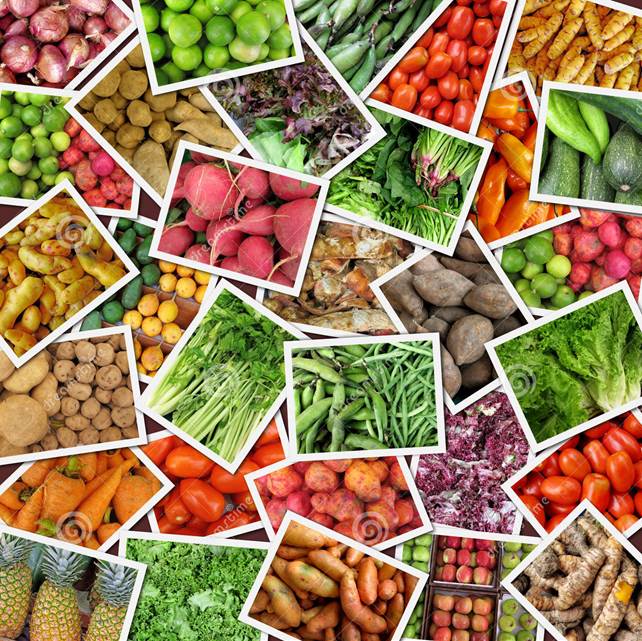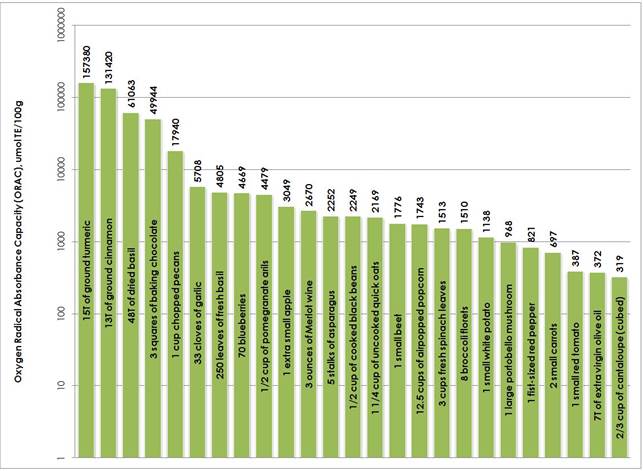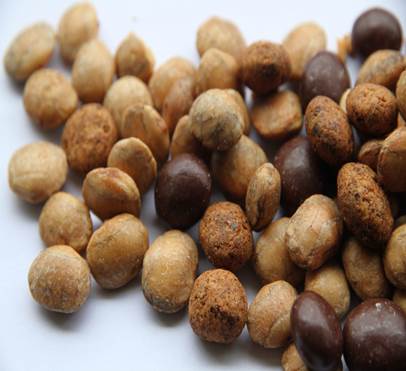While
the terms free radical and antioxidant will be familiar to most health-oriented
people, there is often confusion about exactly what they are and how they can
support or harm our health.

Plant-based foods provide a whopping
64 times more antioxidant levels than meat, fish, eggs and dairy.
In a
nutshell, free radicals are the end result of our normal metabolic processes,
and are also formed during times of prolonged stress, as well as from external
sources such as harmful UV rays from the sun, cigarette smoke, some
medications, excessive alcohol, industrial fumes, toxic chemicals and
pesticides and foods fried at high temperatures. They are extremely unstable
molecules and therefore they go around the body stealing components from
healthy cells, wreaking havoc and damaging or destroying them. Our body is
equipped with its own mechanisms to manage a certain amount of free radicals,
however if free radical levels escalate they cause oxidative damage, which
contributes to premature aging and a decline in brain function as well as the
development of chronic health conditions such as cancer, heart disease and
immune system disorders.
The good
news is that Mother Nature provides some power-packed superfoods and herbs and
spices that are high in antioxidants – compounds that act against oxidative
damage by stabilising the free radicals and supporting the body’s natural
strength and defenses. The standard measurement for ascertaining the
antioxidant levels present in foods is the Oxygen Radical Absorbance Capacity
(ORAC) scale, which rates the effectiveness of antioxidants to absorb free
radicals. The higher the ORAC score, the higher the level of antioxidants
present in the food. Plant-based foods provide a whopping 64 times more
antioxidant levels than meat, fish, eggs and dairy.

The standard measurement for
ascertaining the antioxidant levels present in foods is the Oxygen Radical
Absorbance Capacity (ORAC) scale, which rates the effectiveness of antioxidants
to absorb free radicals
Eating a
variety of seasonal, organic fruits and vegetables will undoubtedly enrich your
antioxidant quotient and help keep you fighting fit. However, by regularly
boosting your antioxidant levels with some super-antioxidant foods you can help
improve your cardiovascular function and circulation, energy levels, immunity
and wellbeing, brain function, eye health and vision and help minimise muscle
fatigue.
Red wine
contains the sexy antioxidant resveratrol, but taking it in capsule form is
better than drinking the 38 bottles required to get beneficial results. Studies
are being undertaken for heart heath, blood pressure, cholesterol and even
longevity. Red and purple berries including blackcurrants, blueberries,
blackberries, strawberries, raspberries, cranberries, elder berries, acai berries,
goji berries and grapes are all rich in antioxidants called anthocyanins.
Anthocyanins are produced by plants as a form of protection from herbivores and
parasites as well as for defense from UV light. Interestingly blackcurrants
grown in New Zealand contain the highest levels of anthocyanins due to the lack
of ozone in this geographical region. Berries are versatile and delicious to
add to smoothies, cereals, and desserts or just as a healthy snack on their
own. Additionally single berries or blends are available in supplement form as
powders and capsules.
Sacha inchi
and Chia seeds are relative newcomers to our western superfood repertoire. Both
come from plants native to South America where they have been cultivated and
used by indigenous populations for centuries. In addition to being great
sources of complete proteins, essential fatty acids and a range of vitamins and
minerals, Sacha inchi and Chia both deliver a potent antioxidant hit. Sacha
inchi seeds and their oil contain the antioxidant vitamins A and E, and Chia
provides flavonoids, phenolic acids, zinc and vitamin C. The high antioxidant
levels of Chia seeds gives then a long shelf life – they can be kept
unrefrigerated for up to two years without losing their potency. Sacha inchi
and chia seeds can both be used in smoothies, cereals and desserts, and chia
seeds, which swell up in liquids can be added to juices to make a delicious and
healthy energy drink.

Sacha inchi and Chia seeds are
relative newcomers to our western superfood repertoire
More
exciting news on the superantioxidant front is the amazing health benefits
provided by cacao. Cacao is raw chocolate – so still provides the
phenylethylamine (PEA) and anandamide hit that keeps us reaching for the choccy
bar, but without all the added unhealthy fats and sugar. PEA is a chemical that
we make when we are feeling excited or fall in love. Anandamide is another
“happy” chemical that is found in our brain when we are feeling positive.
Little wonder that the name Cacao, or Theobroma cacao beans, quite literally
means Food of the Gods. Because cacao is raw and unprocessed, it is packed full
of antioxidants and other health-giving nutrients; in fact the antioxidant
level of raw cacao is off the scale in terms of its potency and includes
polyphenols, catechins, and epicatechins. Cacao also contains high levels of
magnesium which helps fight against acid build-up, calms our nerves and relaxes
our muscles. Additionally cacao provides the minerals iron – important for
keeping our blood healthy, and chromium – to balance our blood sugar and help
prevent cravings and tiredness.
Virgin
coconut oil is another delicious super-antioxidant food which has been shown in
studies to increase levels of the body’s own antioxidants superoxide dismutase,
glutathione peroxidase and glutathione reductase. Ideal for use in cooking
–stir fries, roasting, baking due to its high stability when heated, coconut
oil can also be used to make delicious snacks and is softening and hydrating to
use on your skin (face and body) and to treat dry, stressed hair.